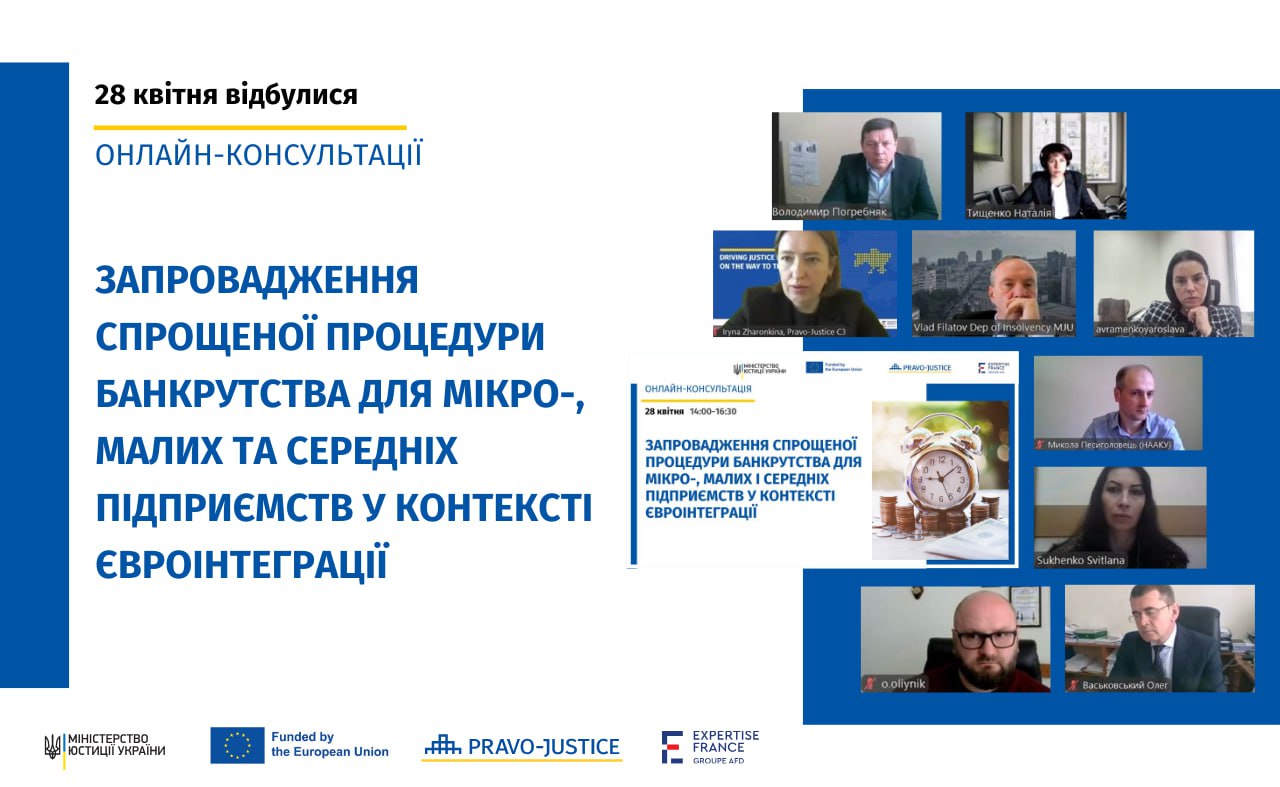EU Project Pravo-Justice Supported an Online Consultation on Simplifying Bankruptcy Procedures for Micro, Small, and Medium-Sized Enterprises

On 28 April, EU Project Pravo-Justice supported an online consultation “Introducing Simplified Bankruptcy Procedures for Micro, Small and Medium-sized Enterprises (MSMEs) in the Context of European Integration”, organised by the Ministry of Justice of Ukraine. Representatives of the Ministry of Justice, the Ukrainian National Insolvency Trustees Association, the Independent Association of Banks of Ukraine, the State Tax Service, the judicial community, in particular justices of the Commercial Court of Cassation within the Supreme Court, judges of courts of appeal and local commercial courts, as well as experts from EU Project Pravo-Justice, participated in the discussion.
The consultation served as a platform for discussing the introduction of simplified bankruptcy procedures for micro, small and medium-sized enterprises in line with European best practices and the Ukraine Facility requirements. In particular, the event focused on the methodology for conducting research on MSMEs insolvency in order to examine how these businesses perceive bankruptcy procedures, what problems they encounter, and what specific aspects could be simplified.
Oleksandr Oliinyk, Director of the Directorate of Justice and Criminal Justice of the Ministry of Justice, said that the event marked a starting point for an in-depth needs assessment for such businesses.
“We are holding this event to understand two important things: first, how to identify the needs of micro, small and medium-sized enterprises; second, what legislative changes need to be introduced to simplify bankruptcy procedures for these businesses. It is proposed to conduct the survey among liquidators as they are currently authorised to perform functions related to enterprises undergoing the liquidation process. We want to compile statistics on MSMEs bankruptcies over the last five years,” said Oleksandr Oliinyk.
The participants paid considerable attention to defining criteria for micro, small and medium-sized enterprises, improving the wording of these criteria in Ukrainian legislation and incorporating them into the Bankruptcy Code of Ukraine.
Iryna Zharonkina, Enforcement and Protection of Property Rights Component Lead of EU Project Pravo-Justice, noted that such criteria are proposed, inter alia, in the European Commission Recommendation 2003/361/EC. The criteria are based on companies’ number of employees, annual turnover and the balance sheet value of assets. These criteria are integrated into the national legislation of many EU Member States and are used, in particular, to identify companies eligible for simplified bankruptcy procedures.
Oleh Vaskovskyi, a justice of the Supreme Court, highlighted that it is vital to determine the goals of introducing simplified bankruptcy procedures.
“We need to decide whether the simplified procedure is intended to speed up the liquidation process or give the debtor a chance to recover, which will determine the mechanisms to be incorporated into the Bankruptcy Code of Ukraine or other regulations,” said Oleh Vaskovskyi.
Vladyslav Filatov, Director of the Bankruptcy Department of the Ministry of Justice, noted that the World Bank and UNCITRAL Legislative Guide on Insolvency Law for Micro- and Small Enterprises are really important. Given the particularities of this category of enterprises, namely their small capital volume, dependence on market demand, etc., they require a simpler, more flexible and cheaper procedure that would enable swift restructuring and, second, swift liquidation and debt relief.
“These enterprises are crucial to the economy, generating 80-90% of gross income in America, Asia and Europe. Therefore, losing such enterprises means losing GDP, employment and social stability. And this is just one of many reasons why simplified procedures for MSMEs should be introduced,” noted Vladyslav Filatov.
In turn, Pavlo Pryhuza, a judge of the Commercial Court of Zakarpattia Region, emphasised that bankruptcy cases should be considered in a fair and professional manner and that it is important not to put too much pressure on entrepreneurs.
“It is essential to harmonise civil legislation with bankruptcy legislation. Complex and cumbersome procedures merely complicate business operations and have a negative impact on the country’s investment climate,” said Pavlo Pryhuza.
Svitlana Sukhenko, Head of the Expert Group on Justice Sector Institutions of the Directorate of Justice and Criminal Justice of the Ministry of Justice of Ukraine, noted that the discussion will be followed by drafting a questionnaire for needs assessment of micro, small and medium-sized enterprises in bankruptcy procedures and initiating discussions on legislative changes required to introduce simplified bankruptcy procedures for these enterprises.